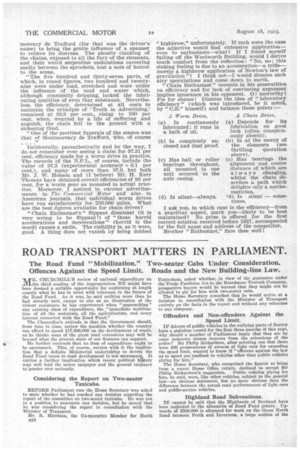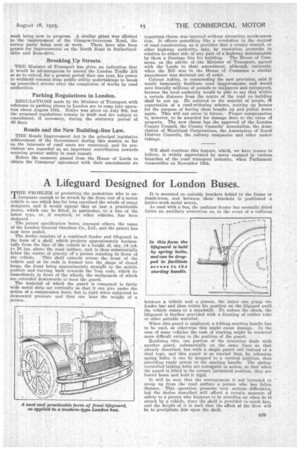ROAD TRANSPORT MATTERS IN PARLIAMENT.
Page 12

Page 13

If you've noticed an error in this article please click here to report it so we can fix it.
The Road Fund "Mobilization." Two-seater Cabs Under Consideration. Offences Against the Speed Limit. Roads and the New Building-line Law.
lipt. CHURCHILL'S review of national expenditure on .1_Vithe third reading of the Appropriation Bill might have been deemed a suitable opportunity for explaining at length exactly what he has in mind with reference to the future of the Road Fund. As it was, he said nothing more than he had already said, except to cite as an illustration of the violent resistance he has experienced when "approaching" any existing class of expenditure, the "immediate mobilization of all the motorists, all the agriculturists, and every interest connected with the Road Fund."
The Chancellor's attitude is that the Government should, from time to time, review the question whether the country can afford to spend 117,000,000 on the development of roads, as he thinks some of the great road extensions may well be beyond what the present state of our finances can support.
• He further contends that no item of expenditure ought to be sacrosanct. This, of ,.course, carries with it the implication that a definite Ministerial undertaking to devote the Road Fund taxes to road development is not sacrosanct:. It carries a further implication which recent political history may well lead the motor taxpayer and the general taxfayer to ponder over seriously.
Considering the Report on Two-seater Taxicabs.
BEFORE Parliament rose the Home Secretary was asked to state whether he had reached any decision regarding the report of the committee on two-seater taxicabs. He was not in a position to announce any decision, but he stated that he was considering the report in consultation with the Minister of Transport. Mr. R. Morrison, the Co-Operative Member for North 1328 Tottenham, asked whether, in view of the guarantee under the Trade Facilities Act to the Beardmore Taxicab Company, prospective buyers would be warned that they might not he allowed to ply for hire with two-seater cabs.
The Home Secretary remarked that be would arrive at a decision in consultation with the Minister of Transport entirely pn the facts in the report and without any reference to any company.
Offenders and Non-offenders Against the Speed Limit.
IF drivers of public vehicles in the outlying parts of Surrey have a stainless record for the first three months of this year, why should a member of Parliament imply that they are by some unknown means immune from the attentions of the police? Sir Philip RichaMson, after pointing out that there were 466 prosecutions of owners of light cars for exceeding the speed limit, wanted to know if "offences against the law as to speed are confined to vehicles other than public vehicles plying for hire."
The Home Secretary, who recognized the figures as being from a recent Home Office return, declined to accept Sir Philip Richardson's suggestion. Public vehicles plying for hire, be said, were, like other vehicles, subject to the general law—an obvious statement, but no more obvious than the difference between the actual road performances of light cars and public-service vehicles.
Highland Road Subventions.
IT cannot be said that the Highlands of Scotland have been neglected in the allocation of Road Fund grants. Upwards of 1500,000 is allocated for work on the Great North Road between Perth and Inverness, a large section of the
work being now in progress. A similar giant was allotted to the improvement of the Glasgow-Inverness Road, the survey party being now at work. There have also been grants for improvements on the North Road in Sutherlandshire and Ross-shire.
Breaking Up Streets.
THE Minister of Transport has given an indication that it would be advantageous to amend the London Traffic A-e't so as to extend, for a greater period than one year, his power to withhold consent from public utility undertakings to break up prescribed streets after the completion of works by road authorities.
Parking Regulations in London.
REGULATIONS made by the Minister of Transport with reference to parking places in London are to come into operation about August 18th. Notice was given on July 9th, but the proposed regulations remain in draft and are subject to amendment, if necessary, during the statutory period of 40 days.
Roads and the New Building-line Law.
THE Roads Improvement Act is the principal legislative achievement of the Government during this session so far as the interests of road users. are concerned, and its provisions are regarded as an important contribution towards securing greater safety in road transit.
Before the measure passed from the House of Lords to obtain the Commons' agreement with their amendments an
important clause was inserted without attracting much atten• tion. It effects •something like a revolution in the control of road construction, as it provides that a county council, or other highway authority, may, by resolution, prescribe in relation to either side of any part of a'highway maintainable by them a frontage line for building. The House of Commons, on the advice of -the Minister of Transport, agreed with the Lords in their amendment, although, curiously, when the Bill was in the House of Commons a similar amendment was declared out of order.
Colonel Ashley, in commending the new provision, said it would immensely facilitate road improvements and would save literally millions of pounds to taxpayers and ratepayers, because the local authority would be able to say that within a certain distance from the centre of the road no building shall be put up. He referred to the scandal of people, At expectation of a road-widening scheme, potting up houses for the purpose of having them bought up and pulled down again. This will not occur in future.. Proper compensation is, however, to be awarded for damage done to the value of property. The new clause has the approval of the London County Council, the County Councils' Association, the Association of Municipal Corporations, the Association of Rural District Councils, the railway conipanies and other undertakings. ,
WE shall continue this feature, which, we have reason to believe, is widely appreciated by many engaged in various branches of the road transport industry, when Parliament reassembles on November lEith.




























